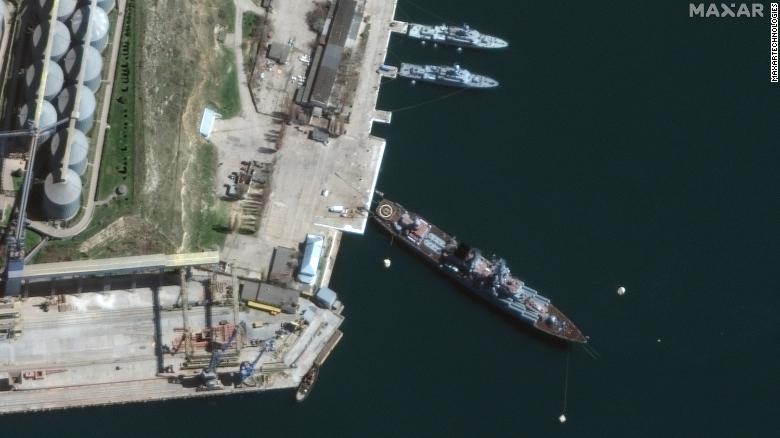One of the Russian Navy’s most important warships has sunk in the Black Sea, a massive blow to a military struggling against Ukrainian resistance 50 days into Vladimir Putin’s invasion of his neighbor.
Russian state news agency TASS reported Thursday evening that the guided-missile cruiser Moskva had sunk, citing a statement from the Russian Ministry of Defense.
“During the towing of the cruiser Moskva to the port of destination, the ship lost its stability due to hull damage received during a fire from the detonation of ammunition.
In the conditions of stormy seas, the ship sank,” the statement said, according to TASS.
Conflicting accounts have emerged about the incident.
Ukraine’s Operational Command South claimed earlier on Thursday that the Moskva had begun to sink after it was hit Ukrainian Neptune anti-ship missiles.
“In the Black Sea operational zone, Neptune anti-ship cruise missiles hit the cruiser Moskva, the flagship of the Russian Black Sea Fleet — it received significant damage,” the statement said. “A fire broke out. Other units of the ship’s group tried to help, but a storm and a powerful explosion of ammunition overturned the cruiser and it began to sink.”
Russia said a fire broke out on the guided-missile cruiser, causing munitions aboard to explode, inflicting serious damage to the vessel, and forcing the crew of the warship to be evacuated.
CNN has not been able to independently verify what caused the damage to the ship.
Earlier in the day Russia’s defense ministry had said that the Moskva “remains afloat” and that measures were being taken to tow it to port. The ministry said the crew had been evacuated to other Black Sea Fleet ships in the area.
Two sources familiar with US and Western intelligence told CNN on Thursday that Ukraine’s claim is believed to be credible, although US officials do not yet have definitive proof.
One source familiar with the latest intelligence said that the US believes with “medium confidence” that Ukraine’s version of events is accurate.
Both sources cautioned that the US has not yet made an independent attribution.
“We’re not in a position to officially confirm independently what exactly led to the ship’s now sinking,” Pentagon press secretary John Kirby told CNN’s Jake Tapper on Thursday. “But we’re also not in any position to refute the Ukrainian side of this.
It’s certainly plausible and possible that they did in fact hit this with a Neptune missile or maybe more.”
Whatever happened to the Moskva, analysts say its loss would strike hard at the heart of the Russian navy as well as national pride, comparable to the US Navy losing a battleship during World War II or an aircraft carrier today.
“Only the loss of a ballistic missile submarine or the Kutznetsov (Russia’s lone aircraft carrier) would inflict a more serious blow to Russian morale and the navy’s reputation with the Russian public,” said Carl Schuster, a retired US Navy captain and former director of operations at the US Pacific Command’s Joint Intelligence Center.

Alessio Patalano, professor of war and strategy at King’s College in London, said losing the warship would be a “massive blow” for Russia.
“Ships operate away from public attention and their activities are rarely the subject of news. But they are large floating pieces of national territory, and when you lose one, a flagship no less, the political and symbolic message — in addition to the military loss — stands out precisely because of it,” he said.
The 611-foot-long (186 meters) Moskva, with a crew of almost 500, is the pride of the Russian naval fleet in the Black Sea. Originally commissioned into the Soviet navy as the Slava in the 1980s, it was renamed Moskva in 1995 and after a refit reentered service in 1998, according to military site Naval-Technology.com.
The Moskva is armed with a range of anti-ship and anti-aircraft missiles as well as torpedoes and naval guns and close-in missile defense systems.
All those represent massive amounts of explosive ordnance in its ammunition magazines. Any fire nearing them would have given the crew limited options to deal with the threat, Schuster said.
“When a fire reaches your ammunition magazine(s), you have two choices; 1) flood them or 2) abandon ship,” Schuster said. “Otherwise your crew is onboard to be wiped out by the catastrophic explosion that follows a fire reaching several hundred tons of ordnance.”
Odesa state regional administrator Maxim Marchenko claimed in a post on Telegram that Ukrainian forces had used Neptune cruises missiles to attack the Moskva. If that’s true, the Moskva would potentially be the largest warship ever taken out of action by a missile, Schuster said.
Such an achievement would represent a big advance for Kyiv’s forces.
The Neptune is a Ukrainian weapon, developed domestically based on the Soviet KH-35 cruise missile. It became operational in the Ukrainian forces just last year, according to Ukrainian media reports.
As reported by CNN
